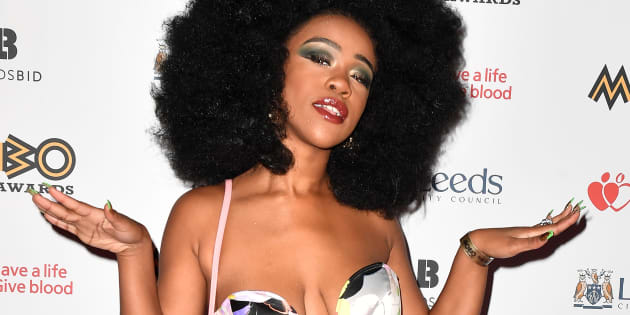
Not all bodies are alike and the same goes for your breasts.
#SaggyBoobsMatter — a movement whose aim is to raise awareness on the types of breasts not typically seen in the media — is trending on social media, and followers of the hashtag are taking to Twitter and Instagram to show the world that they're proud of their low-hanging breasts.
A post shared by Chidera (@theslumflower) on
Women are constantly bombarded with images of bodies that are altered or only represent a narrow group of women. Victoria's Secret, for example, features women whose breasts appear to not sag, and if you were to flip through any fashion magazine, you'd be hard pressed to find women who have different kinds of breasts, much less breasts that sit low on the chest.
All of which leaves women like Chidera Eggerue, who happens to have saggy breasts, feel undesirable and not beautiful.
Eggerue, the 23-year-old British/Nigerian blogger known as The Slumflower on Instagram, launched the #SaggyBoobsMatter campaign last July, and watched as it took off online. It has even been shared by influencers such as U.K. model Sonny Turner, who wrote on Instagram, "#SaggyBoobsMatter. & if I saw them in the media, in their natural form like this, I wouldn't be so self conscious about them. I wouldn't feel frumpy and fat and not sexy or womanly. I wouldn't think they're abnormal because they're not perky, touching, or pushed up to the gods constantly."
"Due to under-representation of saggy-looking boobs in the media, we are all taught that there's only one way to be beautiful and that includes having super perky boobs ... If I had seen women with saggy boobs being glorified for their beauty, I wouldn't have developed a complex as a very young teenager," Eggerue wrote on her website last July.
As a young teen learning about her body, Eggerue said she found bra shopping particularly difficult. The lack of representation for breasts that looked like hers was especially hard. "The packaging would always have a picture of a white woman with perky boobs, yet when I'd try on the same bra in my correct size, my boobs just wouldn't look like the model pictured," she recently told Buzzfeed News.
As a result, Eggerue said she began to resent her breasts and considered getting them surgically altered. "I reached 19 and became tired of feeling like a stranger in my own body. I decided I'd had enough and made the choice to stop wearing a bra," she told Buzzfeed News.
Women online say they're grateful for the movement, with some writing that it gave them more confidence — proving Eggerue's point that there needs to be a variety of breasts shown in the media, not just one type. "The more you see someone who looks like you in positions of success, the more your image is normalized; the less of a spectacle your reflection is; the more comfortable you will be in your body. It is that deep," she wrote on her website.
Eggerue said she hopes to continue supporting women who are going through what she did. "My content revolves around female empowerment and social issues and this made me realize that if I'm connecting with women online, there are also women offline who will be able to relate to me," Eggerue told OkayAfrica in April. "I want to be the voice I wish I had, for someone else," she continued.
Studies have shown that the media's depictions of women's bodies have an adverse affect on them. "The American ideal of beauty has become so pervasive that 50 per cent of three- to six-year-old girls worry about their weight," Harvard University reported in 2015.
This is also the case in Canada. "Between 80 and 90 per cent of women and girls are unhappy with the way they look" as a result of the media, the Canadian Women's Health Network (CWHN) reported. This can lead to harmful behaviour such as extreme dieting, taking drugs to lose weight, depression and other mental illnesses, and unnecessary surgery, the CWHN noted.
It's not just "regular" women
Plus-size models like Paloma Elsesser and Ashley Graham help to combat these limited depictions of women's bodies through their Instagram pages and in magazine spreads and ads — notably Elesser's recent Glossier ad and Graham's two Vogue covers.
Yet, there is still room for improvement. "[When you feature someone in an editorial and they are half-naked], then it becomes about their body, no matter what they do," stylist Solange Franklin told Refinery29 last year. And #NeverForget the time in 1998 when Vogue editor-in-chief Anna Wintour suggested Oprah Winfrey lose 20 pounds.
Celebrities have also spoken about their saggy boobs. In 2014, Katy Perry talked about her breasts with GQ. "I lay on my back one night and looked down at my feet, and I prayed to God. I said, 'God, will you please let me have boobs so big that I can't see my feet when I'm lying down?'"
When she turned 11, Perry said that, "God answered my prayers ... I had no clue they would fall into my armpits eventually."
In 2010, actress Jessica Alba told GQ, "My breasts are saggy, I've got cellulite, my hips are bigger." And Kate Winslet told The Sun, "I look like the people that walk down the street. I don't have perfect boobs, I don't have zero cellulite — of course I don't — and I'm curvy. If that is something that makes women feel empowered in any way, that's great."
Also on HuffPost:
